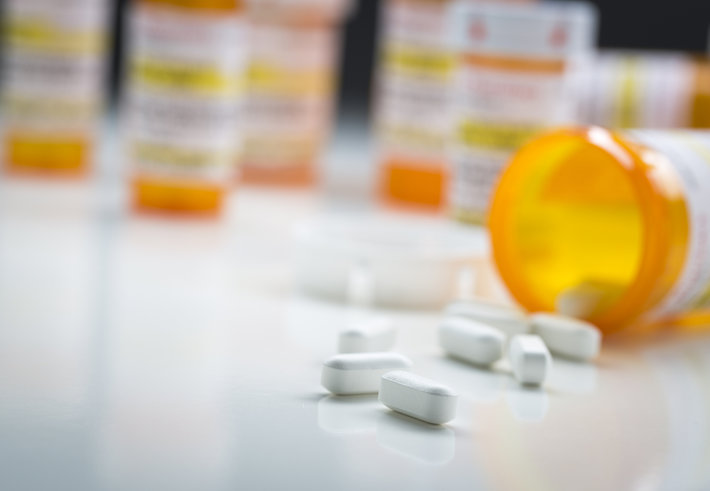Prescription and Over the Counter Drugs Addiction Information

There are several types of prescription and over-the-counter (OTC) drugs that can be addictive. These drugs have the capacity to produce mind-altering effects and may result in overdose and death. Unfortunately, as they are both prescribed and readily available, many individuals are unaware of the risk.
Which Prescription Drugs can Result in Addiction?
These drugs, whether prescribed and taken as directed or abused can result in addiction:
Benzodiazepines (Ativan, Xanax, Valium, Librium, Klonopin). Benzodiazepines are anxiolytic drugs—meaning they are prescribed for anxiety. Benzodiazepines are not intended for long-term use, and even when used for a short period of time can be incredibly addictive.
Barbiturates (phenobarbital, seconal). Barbiturates are a form of central nervous system depressant. The drug reduces the activity of nerves, causing muscle relaxation. Barbiturates can also reduce heart rate, breathing, and blood pressure. When not taken precisely as directed, such drugs can be quite dangerous.
Amphetamines (Ritalin, Adderall, Concerta, Dexedrine). Pharmaceutical amphetamines are mood-altering drugs that can be quite addictive. These drugs are stimulants, meaning they stimulate the central nervous system as opposed to suppressing it. People may experiment with amphetamines to experience a rush of energy or euphoria or to get several tasks done quickly.
Sleep aids (Ambien). Sleep aids, such as Ambien, are often prescribed for insomnia and sleep disorders. However, Ambien prevents natural sleep and can have a mind-altering and addictive effect. In extreme cases, while under the influence of Ambien, a user can “wake up” to discover they have been unaware of preceding events.
Muscle relaxers (Somas). Muscle relaxers are often prescribed for muscle cramps and pain associated with injuries. Muscle relaxers can cause harm to the brain, nervous system, heart, liver, and kidneys.
Dextromethorphan (DXM). Dextromethorphan is an ingredient in many over the counter cough medicine which when abused can create a euphoric effect similar to opioids. To achieve this effect, large amounts of DXM must be used, and the result is an extremely toxic effect on the body and the production of a dissociative state on the mind. Coricidin and Robitussin are both known to contain DXM. Misuse can be quite dangerous, sometimes resulting in a coma or even death.
Pseudoephedrine. An over the counter decongestant medicine, Pseudoephedrine can have a stimulating effect when used to excess. Pseudoephedrine is often used in the creation of illicit methamphetamine as it has a similar chemical structure.
Harmful Consequences of Misusing Prescription Drugs
There is a misconception that because prescription drugs are legal medicines made by “legitimate” pharmaceutical companies, these substances are “safe” and “okay for use.” But that couldn’t be further from the truth. It’s illegal to use prescription drugs in a way that is not their intended use, and many of the legal uses can still lead to addiction.
When prescription drugs are misused, doing so can have harmful effects on a person’s:
- Physical well-being
- Mental health
- Family life
- Career
- Financial situation
- Legal situation
Abusing drugs causes severe damage to the user’s health. Prescription drug use can bring about mood changes, nausea, vomiting, decreased cardiovascular function, addiction, and even death. While different types of prescription drugs may produce different physiological side effects, all have the potential for causing significant damage to one’s physical and mental state.
The Short-Term and Long-Term Effects of Prescription and OTC Drug Use

Some of the short-term effects of prescription drug use include:
- Seizures (Not uncommon with depressant abuse)
- Slowed heartbeat and breathing
- Dangerously high body temperature and heartbeat (Not unusual with stimulant abuse)
- Drug toxicity (overdose or organ-specific poisoning)
- Mood changes, aggressive behavior, violence, nausea, vomiting, coma, death
The long-term effects of prescription drug abuse are also quite dangerous. These are the effects that tend to accumulate over time as one continues to misuse substances. Some examples include:
- Damage to blood vessels in the heart and brain
- Chronic high blood pressure that could lead to heart attacks, strokes, etc.
- Damage to the liver, kidney, and lungs
- Permanent damage to the nasal passages (when drugs are snorted)
- Infectious diseases
- Weight loss or weight gain
- Addiction, psychological dependence, chemical dependence
- Depression, apathy, suicidal thoughts or attempts
- Overdose
- Death
Signs of Use
There can be some challenges in discovering if a loved one is misusing prescription drugs. Not only are drug addicts often quite elusive about their behavior, but prescription drugs, by themselves, are legal. Furthermore, people who are addicted to prescription drugs are often individuals who have legitimate prescriptions for such substances.

But despite all that, there are still signs to be on the lookout for that can indicate someone is misusing prescription drugs.
- Someone who has a prescription but who is taking more drugs than they are prescribed may be addicted. If they are going out of their way to seek medications from other sources, that is also a compelling sign.
- Hostility, changes in sleeping and eating patterns, moodiness, and general antagonism are also signs.
- Stealing or forging prescriptions and ordering prescription drugs online are indicators of drug abuse.
- Lying about the number of meds used is a compelling sign of addiction.
- Stashing medications around the house is a sign of addiction.
- Using prescriptions more rapidly than prescribed or having to borrow medicines from others can also point to addiction.
- Irritability and withdrawal symptoms are also signs of addiction.
Prescription drug addiction is a difficult, complex scenario that is life-threatening and challenging to break free from. But no matter how difficult it is, the family members and loved ones of addicts must get to the bottom of it and get their loved one help. Prescription drugs may be legal, but their misuse creates a life or death situation.
Sources:
